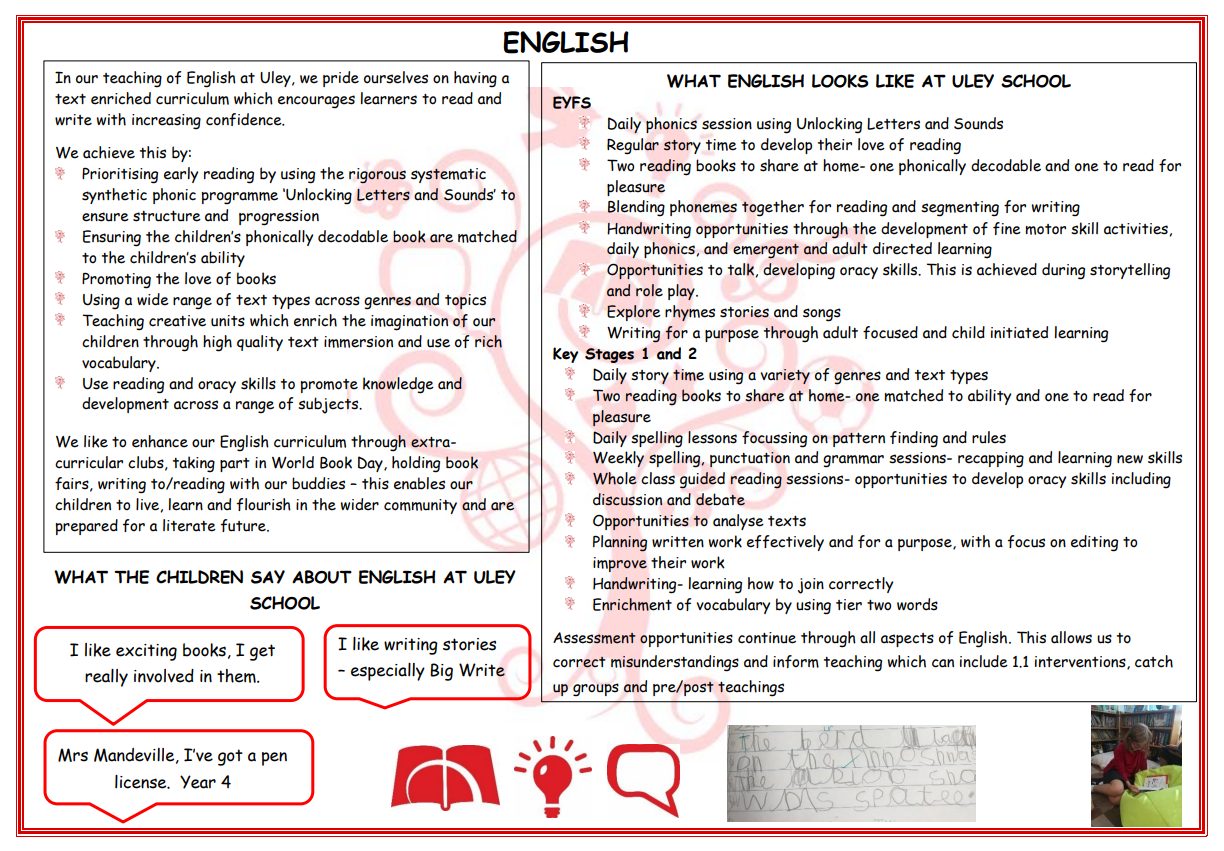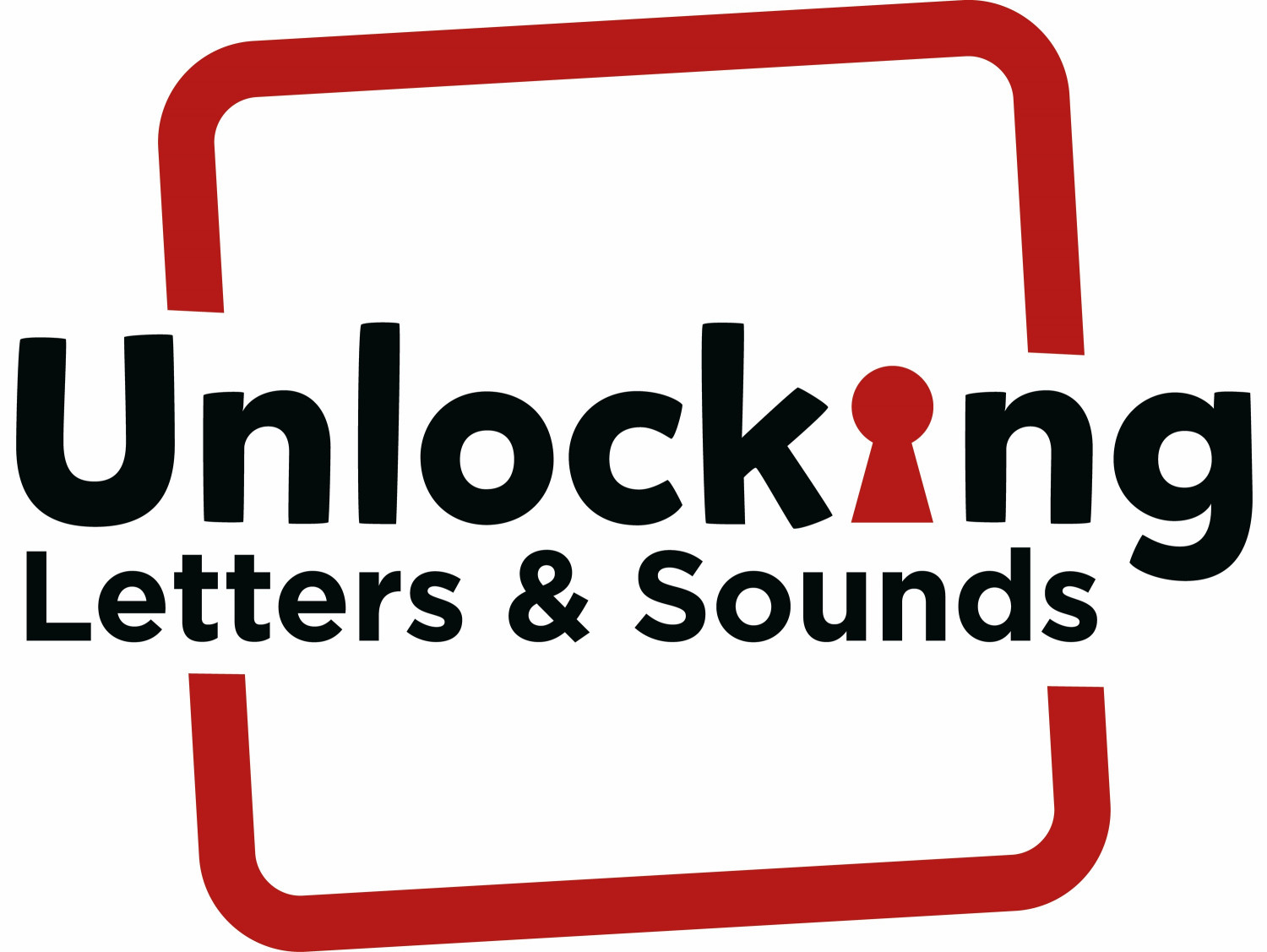ENGLISH AT ULEY SCHOOL

Phonics and Early Reading
At Uley School, we use Unlocking Letters and Sounds which was validated by the DfE in December 2021.
We begin teaching phonics in the first few weeks of term 1 in Reception and children make rapid progress in their reading journey. Children begin to learn the main sounds heard in the English Language and how they can be represented, as well as learning ‘Common Exception’ words for Phases 2, 3 and 4. They use these sounds to read and write simple words, captions and sentences. Children leave Reception being able to apply the phonemes taught within Phase 2, 3 and 4.
Click on this link to see the Phase 2 ‘Actions, Images and Letter Formation’ document
In Year 1 through Phase 5a, b and c, they learn any alternative spellings and pronunciations for the graphemes and additional Common Exception Words. By the end of Year 1 children will have mastered using phonics to decode and blend when reading and segment when spelling. In Year 1 all children are screened using the national Phonics Screening Check.
In Year 2, phonics continues to be revisited to ensure mastery of the phonetic code and any child who does not meet age related expectations will continue to receive support to close identified gaps.
For further details please see the Unlocking Letters and Sounds progression:
Unlocking Letters and Sounds Overview Progression
To ensure no child is left behind at any point in the progression, children are regularly assessed and supported to keep up through bespoke 1-1 interventions. These include Grapheme Phoneme Correspondence recognition and blending and segmenting interventions. The lowest attaining 20% of pupils are closely monitored to ensure these interventions have an impact.
Early Reading Scheme
At Uley School, we promote a 'phonics first' approach and in both our guided reading sessions at school and in the books children take home, texts are very closely matched to a child's current phonics knowledge so that every child can experience real success in their reading.
In these crucial early stages of reading we primarily use books from Ransom Reading Stars Phonics, to ensure complete fidelity to the Unlocking Letters and Sounds progression we follow.
Once children progress beyond decodable texts, they move onto our book scheme so that they can continue to progress in their decoding, fluency and comprehension skills to become avid, expert readers
Reading
Here at Uley Primary School we promote a love for reading and equip all children with the skills needed to become enthused independent readers.
Following on from decodable texts, we use the book banding system which contains a range of texts including non-fiction. The children take a book home appropriate to their level. They read these books at school and are expected to read them at home along with other reading materials they enjoy.
Children have a reading record book to keep a log of their reading habits. Adults frequently listen to children read to monitor their progress and interventions take place for those children needing extra support.
- We have a school library where children have access to a range of fiction and non-fiction books and children visit the library on a regular basis.
- Each classroom has an engaging reading corner designed to promote a love of reading. Children have access to this at different times during the day.
- Guided reading takes place across the school daily. During this session the teacher has a discussion with a group of children about a particular book appropriate to their level. While this is taking place other groups are carrying out an independent book related activity.
- We celebrate reading in school through themed reading weeks, national book days and shared buddy time.
- To engage all readers we hold Scholastic book sales where there is a range of books at an affordable price for the children to buy.
- We also offer workshops to parents, when requested, to support and guide them when reading with their children at home.
The Uley School library is up and running and children love to borrow the books. Please see the timetable and the Library Policy below.
Writing
Writing is at the heart of all we do at Uley Primary School and is taught across the curriculum.
At Uley, we give children the opportunity to write for many purposes and audiences across the curriculum. Children use cursive handwriting and develop their spelling strategies.
In the Early Years, play is very important for allowing children to explore and develop their writing. We encourage children to mark-make in a range of contexts and activities. Through role play, children are given clear purposes for writing and are provided with many opportunities to experiment with writing themselves, both indoors and outdoors.
Children in Key stage one and two are given the opportunity to write a range of genres for a range of purposes. Activities such as book talk, storytelling, role play and drama are an important part of the writing process.
Children are shown how to plan and write both fiction and non-fiction texts and teacher's model writing as part of the lesson. Teachers give children time to review, self-evaluate and edit their writing.
Editing and publishing our writing is an important skill the children learn to do. Teachers and children set individual writing targets together so that all children are clear about how their writing can be improved. The children are given the opportunities to explore and write in response to high quality books that become familiar favourites. At Uley, we feel that children should be given vocabulary developing opportunities so they are able to discuss and explain their ideas with confidence.
Spelling
Once children are secure with their phonic knowledge, the natural progression is learning how to spell. Our english language system can be quite daunting!
All children at Uley School receive focussed daily phonic and spelling lessons.
Handwriting
At Uley we believe that handwriting should not be an occupying activity, it should be taught. In this way incorrect formation can be put right rather than practised. Difficulties with handwriting can inhibit the quality and flow of ideas and also have an adverse affect on spelling.
We aim to foster in the children a sense of pride in the presentation of their work. The ability to produce a good standard of work increases self-esteem and motivates children. We reinforce good achievement through displays of the children’s work in the classroom and around the school, and also by sharing work in class and in our weekly celebration worship.
As soon as children begin to develop a legible hand, we believe that handwriting should be considered at three functional levels so that, for each writing activity, the style matches the purpose.
Please look at our Handwriting Policy for handwriting expectations.
Implementation
Progression of English Skills Infants
Progression of English Knowledge Infants
Progression of English Skills Juniors
Progression of English Knowledge Juniors
Impact
Through delivery of our English curriculum we expect the impact on our children to be - progress, sustained learning and transferrable skills. With the implementation of the writing journey being implemented as soon as a child is ready and taught thoroughly in both key stages, children can become more confident writers. By the time they are in upper Key Stage 2, most genres of writing will be familiar to them and the teaching can focus on creativity, writer’s craft, sustained writing and manipulation of grammar and punctuation skills.
As all aspects of English are an integral part of the curriculum skills taught in the English lesson are transferred into other subjects; this shows consolidation of skills and a deeper understanding of how and when to use specific grammar, punctuation and grammar objectives. We hope that as children move on from us to further their education and learning that their creativity, passion for English and high aspirations travel with them and continue to grow and develop as they do.
